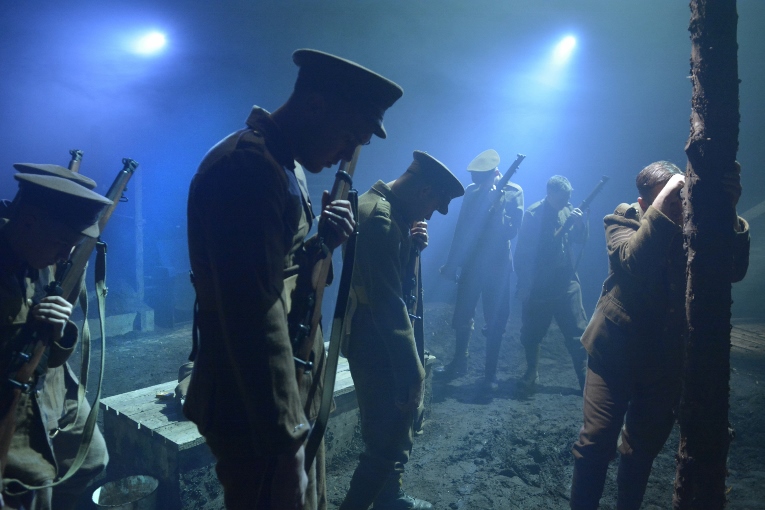Early One Morning. It sounds like the opening of a folk song and, as is often the case in folk songs, there is a truth to be told; storytelling passed from generation to generation which celebrates love and makes sense of what is often a cruel world. And Les Smith’s true story of a Boltonian soldier shot for desertion has all the makings of a haunting, horrid folk song.
First performed at the Octagon back in 1998 when it was commissioned by the theatre to coincide with the 80th anniversary of the armistice in 1918, this true story has been revived for this 100 year commemoration and follows quickly after RC Sheriff’s Journey’s End. But where Journey’s End discussed the now recognisable Post Traumatic Stress Disorder, Early One Morning brings to light the futility of order and commands within a senseless war.
Told through the eyes of a narrator (Colin Connor), the play is told in fragments, flashbacks and the terrible, inevitable conclusion. The play follows Private James Smith during his mental and physical demise, on his recuperation back in Bolton and during those last few days when decisions and discussion were had about the private’s fate. It’s tragic and moving in its entirety and, performed to a predominantly local audience, its power and pertinence is palpable.
Smith joined local regiment the Lancashire Fusiliers aged just 19 and was posted out to India. He was there when the First World War broke out. His regiment was sent to Gallipoli, then the Private was transferred to the Somme where he received his second of two Good Conduct Medals and was promoted to Lance Corporal. But a severe injury to the shoulder took him back home to recuperate and, from here, Smith’s attitude and aptitude for the war diminished.
He handed back his Corporal’s stripe and left his post without orders. He was court-martialed and sentenced to 90 days’ field punishment. Then he was transferred to the Battle of Passchendaele where he went absent not once, but twice and it was these unreliabilities that saw him sentenced to death. He was shot in the head on September 5, 1917 by a fellow soldier (who, incidentally, never recovered from the experience).
It took nine decades for the British State to issue partial pardons for Smith and the other 306 men who were executed during the First World War.
Most of the cast were seen in Journey’s End with the addition of Jessica Baglow who plays Smith’s Sweetheart, Lizzie Cartwright. It’s a fine ensemble with most of them taking multiple roles. But there is a muddled, not entirely successful disjointedness to the piece with flashbacks jarring with the drama of Smith’s last few days.
There’s some glorious use of song wafting through the production and bomb-blasts shaking the core of the characters’ turmoil, but high stakes from the very beginning leaves the play with nowhere to go. We know Smith’s fate from the opening and this means we’re all sort of wondering when Smith is finally going to be told.
The Octagon is doing tremendous work and is surely one of the country’s best and most-loved regional theatres. This stark production is testament to artistic director David Thacker’s vision that audiences should and can be challenged.
Photos: Ian Tilton
What: Early One Morning
Where: Bolton Octagon
When: until November 1, 2014
More info: https://octagonbolton.co.uk/early-one-morning













